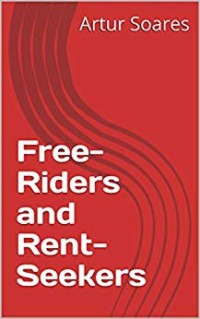Title: Free-Riders and Rent-Seekers
Author: Artur Soares
Publisher: AuthorHouseUK
ISBN: 978-1-7283-8318-7
Pages: 257
Genre: Nonfiction/Sociology/Culture/Economics
Reviewed by: CC Thomas
Pacific Book Review
If the reader is looking for a book that will cause righteous anger followed by worry, then look no further. Free-Riders and Rent-Seekers by Artur Soares looks at economic issues in our modern culture and traces economic trends from past societies, from a historical and unbiased perspective.
For the benefit of discussion, the definition of some terms will be helpful. The author uses the term “free-rider” to mean a person who enjoys benefits and goods, but produces and contributes nothing to society. This does not mean these people merely live on public assistance. Indeed, free-riders can be working people. However, they might create something that does not enhance the world or society with their creations. By contrast, a “rent-seeker” is someone who manipulates wealth and opportunities created by the government, primarily through politics, for their own advantages. While most readers would like to believe they are rent-seekers, most of us likely fall into the free-rider category. For example, have you ever littered rather than throwing something in a trash can? This is an example of a free-rider because you expect others to clean up your mess. Soares uses these terms to explain how common free-riding is in our culture and explains this sociological idea has been prevalent throughout history and is even common in animal societies.
Soares explains that all successful societies have surpluses and use this benevolence towards those who are ill or unable to work. Some see this benevolence and spy an opportunity. According to Soares, there is no way to separate those who truly need help from those who take advantage.
Soares traces how our current American modern culture has evolved into economic instability through the gradual acceptance of free-riding as an accepted lifestyle. One example of this is the state of public education in America. According to Soares, modern students are not prepared for the rigor of higher learning because we, as American parents, have trained them to be free-riders. By paying teachers so poorly and expected them to battle with parents over trivial issues, students become less academicallyinclined and more sheltered. Soares also makes an interesting case against free higher education, arguing that the lack of academic rigor makes this little more than a babysitting enterprise for young adult free-riders.
The author argues higher education should not be geared for everyone because not everyone is suitable to become a doctor, for example. However, our youth-oriented society has skewed our thinking and enabled a new generation that believes they can do anything—and are entitled to everything. In Free-Riders and Rent-Seekers, Soares does not make proposals for change. Rather, he simply traces historical perspectives of the issues and lets the reader make his or her own conclusions. The book is a fascinating and uncomfortable look at our modern American culture and paints a dire picture for the next generation. If current trends continue, America will be a nation of free-riders with fewer and fewer producers working for less and less as a vast wealth transfer occurs to a generation that does little to earn it, but expects it nonetheless. Soares suggests that the transfer of wealth from producers to consumers will continue unabated, setting the stage for an economic dystopia.
While many other topics, such as global warming, take center stage, Soares’ work should be heard…before it is too late. This book must be read by every American. Free-Riders and Rent-Seekers is well written and thoroughly researched book. This is not light reading, but it is highly rewarding.


